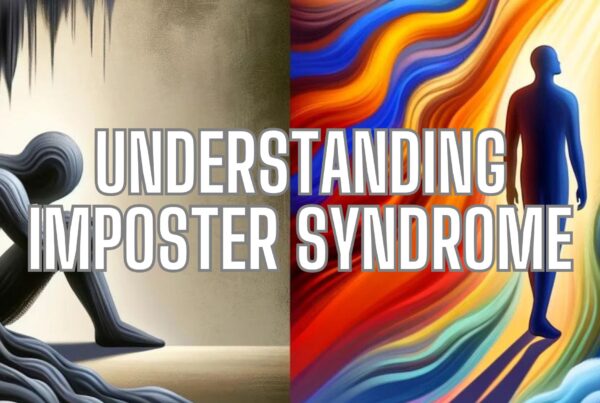Recognising Triggers of Imposter Syndrome
Recognising triggers of imposter syndrome is crucial for anyone struggling with this pervasive issue. After years of feeling like a fraud in their job, an understanding of what it is can begin to shift the experience. Often hidden in plain sight, these triggers can catalyse a cycle of self-doubt and perceived fraudulence, despite evident successes. It is important to identify these triggers as they form the basis for effective management strategies. Read on to the end of this blog to sign up for a FREE email mini-course to help overcome imposter syndrome.
The Experience of Imposter Syndrome
Imposter syndrome, a term first coined in the 1970s, captures the internal experience where individuals believe they are not as competent as others perceive them to be. For those interested, you might wish to read the previous blog on understanding imposter syndrome. These feelings are frequently triggered by specific events or environments that push individuals out of their comfort zones or into the spotlight.
The Common Triggers of Imposter Syndrome
Some of the key triggers of imposter syndrome include:
- Being out of your comfort zone, such as public speaking opportunities, starting a business, getting a promotion, or leading a project
- Achieving success quickly or at a young age
- Being in the minority, such as being a woman in a male-dominated field
- Being the first or only person like you in a role due to age, gender, family history, ethnicity or sexual orientation
- Experiencing bullying or harassment in the workplace or personal life
- Competitive or toxic work environments that pit colleagues against each other
- Receiving external validation like awards, being a top performer, or media appearances
- Entering a new role or setting, like starting college or a new job, which can trigger feelings of inadequacy
Imposter syndrome appears to be more common when people are going through transitions and trying new things. The pressure to achieve and succeed, combined with a lack of experience, can trigger feelings of being a fraud
Common Triggers in Professional Settings
One of the most common settings where recognising triggers of imposter syndrome becomes essential is the workplace. New job roles, for instance, can serve as significant triggers. The responsibility of meeting new expectations and the fear of not living up to them can intensify feelings of being an imposter.
High-stakes projects also rank highly as triggers. When the outcome of a project has significant consequences, the pressure can make even the most seasoned professionals question their abilities. Public recognition, paradoxically, often exacerbates these feelings, as praise for one’s achievements can lead to fear of future exposure as a fraud.
Common Triggers in Academic and Personal Environments
Academic environments are equally fraught with triggers for imposter syndrome. Students often face intense competition and high expectations, which can lead to doubts about their own intellectual abilities compared to their peers. This is especially pronounced during examinations or when presenting research findings.
In personal settings, social interactions can also trigger imposter feelings. Events such as family gatherings or social outings where individuals discuss their professional successes can lead to comparisons that fuel the syndrome.
Strategies to Identify Your Personal Triggers
Recognising your personal triggers is the first step towards managing imposter syndrome. It involves self-reflection and possibly maintaining a journal to document instances where imposter feelings arise. Noticing patterns in these instances can provide crucial insights into the specific situations or interactions that provoke these feelings.
Awareness of these triggers allows individuals to prepare mentally and emotionally before facing similar situations in the future. For example, if high-stakes meetings are a trigger, one could prepare through rehearsals or by seeking feedback from trusted colleagues beforehand.
Techniques to Identify Triggers of Imposter Syndrome
Here are some techniques a person can use to recognise their imposter syndrome triggers:
- Reflect on situations where you’ve felt like an imposter in the past, such as starting a new job, receiving an award, or being in the minority in a group. Identify common themes or events that tend to trigger these feelings.
- Pay attention to your thoughts and feelings in the present moment. Notice when you start having self-doubting thoughts like “I don’t belong here” or “I’m going to be exposed as a fraud”. Recognise these as potential imposter syndrome triggers.
- Keep a journal to track when you experience imposter syndrome. Note the specific situation, your thoughts and feelings, and any external factors like feedback from others. Patterns may emerge over time.
- Talk to trusted friends, family or colleagues about your experiences with imposter syndrome. Discussing your feelings openly can help you identify triggers and feel less alone.
- Seek feedback from others who know your abilities well. Their perspective can help counter the self-doubt and provide a more realistic assessment of your competence.
- Consider working with a therapist who can help you explore the root causes and triggers of your imposter syndrome in a safe, supportive environment.
The key is to develop self-awareness around when and why you feel like an imposter. With practice, you can learn to recognise the signs early and intervene before the self-doubt spirals. Identifying your unique triggers is an important first step in overcoming imposter syndrome
Managing Triggers with Therapy and Mindfulness
Engaging in therapies such as Cognitive Behavioural Therapy (CBT) and Acceptance and Commitment Therapy (ACT) can be highly effective in managing imposter syndrome. These therapies help reframe negative thoughts and develop healthier responses to triggers.
Mindfulness and hypnotherapy are also beneficial, as they help individuals stay present and grounded, reducing the impact of triggers. Regular practice of mindfulness can diminish the intensity of imposter feelings when they are triggered, providing a sense of calm and control.
Recognising Triggers Is Empowering
It is important to note here that no therapy is a one size fits all. Human beings are complex and, for that reason, therapy will always have an aspect of exploration and trial to determine which approaches are going to work best for the individual. Awareness of the problem needs to be the starting point though as it brings an insight into the when, what, and why that the problem occurs.
Recognising triggers of imposter syndrome is an empowering step. It not only helps individuals understand and anticipate the situations that may lead to heightened self-doubt but also equips them with strategies to counter these feelings effectively. By identifying and addressing these triggers, individuals can begin to feel more secure in their roles and less influenced by unfounded fears of inadequacy.
Release Hypnosis Melbourne Hypnotherapy
Since 2016, Lawrence Akers has been working under the name Release Hypnosis offering Hypnotherapy and ACT based work to the people of Melbourne or an online service. Based on St Kilda Rd, Release Hypnosis is an easy and convenient location to get to and accessible by the ANZAC station train and tram stop. Release Hypnosis can help with a wide range of presenting issues, and I offer a free 30 minute no obligation discovery call for those who are unsure if hypnotherapy is the right way forward for them.
Sign Up For a FREE Email Mini-Course to Help Overcome Imposter Syndrome.
Book Your FREE 30 Minute Consultation With Release Hypnosis NOW!
You may also like to read:
Exploring Content-Free Hypnotherapy
The Journey to Becoming a Better Hypnotic Subject
Best Hypnotherapy Resources 2023: Release Hypnosis Top Blogs
What Is The Success Rate of Hypnosis?








